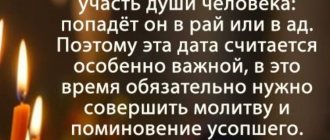A funeral is a rite, an action with which, according to Orthodox canons, a person’s earthly life ends. They are organized by relatives or the state if the deceased had no relatives (a lonely grandmother died) or he was homeless. If the deceased was an Orthodox Christian, certain procedures are carried out on his body in the first days after death. Let's talk about how a funeral takes place, what organizing a funeral is, where to start, and what to do if the deceased was not baptized, lived not in Russia, but for example, in America, was a Baptist, in more detail.
What is death in Orthodoxy
Man is the totality of his physical and spiritual. The human soul is immortal, only the physical shell dies. According to Orthodox beliefs, people say goodbye to the deceased within 40 days. His soul, depending on his earthly deeds, goes to Heaven or Hell. This does not happen right away:
- for the first 3 days, the soul wanders the earth, watching its loved ones, but invisible to them (it is accompanied by angels who allow the deceased to say goodbye to earthly life and facilitate his transition);
- from 3 to 9 days the soul is in Paradise, it is shown all the delights of this place;
- from 9 to 40 days the deceased remains in Hell.
After the specified period, the location of the soul is finally determined. So that a relative does not go to Hell, one is supposed to pray for him. It is extremely important to begin reading prayers immediately after death and during the first 3 days. To make it easier for the soul to part with its earthly shell and help it pass through the gates of heaven, the clergyman must sing the funeral service for the body. Without knowing how people are buried, it is best to approach the priest or funeral home with this question.
Burial process and additional attributes
The procedure for seeing off the last journey is identical for both men and women. The list of traditional rituals includes:
- washing the body, dressing;
- funeral service in the house;
- transportation to the necropolis;
- farewell to relatives;
- after the final chant of the clergyman and the reading of prayers, the lid of the house is closed and hammered in and its burial pit is lowered;
- everyone throws three piles of earth, accompanying them with a kind word about the deceased; They dig a hole and erect a cross as a symbol of faith and Orthodoxy.
If relatives are lost and find it difficult to organize everything due to mental anguish, then you can contact a funeral home, where specialists, observing all traditions and wishes, organize the woman’s funeral in the best possible way and at an affordable price.
What happens to the soul without a funeral service
By the time of the final parting with earthly life, on the 3rd day after death, the soul begins to experience terrible suffering. They can be alleviated by special prayers read by the priest during the funeral service. The Church seems to stand up for a person before the Lord.
The funeral service can be in absentia, but in most cases the procedure is carried out in the church over the body of the deceased
If the soul is not inveterate, it still has a chance to go to Heaven, but this will not be easy; during the funeral service, a kind of cleansing of the sins that the deceased repented of before death occurs. The absence of a funeral service will not allow the soul to be fully cleansed.
Basic rules for funerals in Orthodoxy
Relatives and loved ones say goodbye to the deceased.
For an immortal soul, it does not matter what happens to its mortal physical shell. Funerals are intended to reconcile the deceased's surviving relatives with his death. The absence of a grave, if a person disappeared in the mountains or drowned in the sea, does not affect his posthumous fate in the Kingdom of Heaven.
There are no rules that allow you to organize a funeral as it should be. The Bible contains information that allows us to properly care for the soul of a deceased person, but not for his body. Many rituals observed during funerals, including by believers, are pagan and are not approved by the Church (filming a video, for example, a video from the funeral of Alla Verber).
What are Orthodox Christians buried in?
There are many questions regarding the rite of burial of the deceased, for example, whether Orthodox Christians bury on Sunday or what kind of attire to choose. The choice of clothing should be based on the status occupied by the deceased. It is customary for ordinary people to be buried in an ordinary suit, but for military personnel, firefighters, and police officers - in uniform. Is it possible to bury a man in a sweater? This is not prohibited, as it may be the last will of the deceased. But the main requirement when choosing is that it should easily fit on the deceased.
Also, the deceased can express his last will regarding his attire. You need to listen to her. It can be:
- ties,
- caps,
- shoes,
- scarves,
- caps.
The best article for you, go to: Is it possible to pray during menstruation
The top of the body of the deceased is covered with a church veil. It can be purchased at a church shop or a special store.
Necessary documents for funeral
Funerals do not only concern close relatives. Before burying a person, it is necessary to follow the procedures defined by the state:
- call a doctor to confirm the fact of death (if a person died at home, call an ambulance);
- notify the police.
A doctor and a police officer must establish the cause of death; they are called even in cases where a person has died after a long illness or from old age
You can organize a funeral (book a place in the cemetery, negotiate with funeral services) only if you have the following documents in hand:
- certificate of examination of the corpse (issued by the police);
- medical death certificate (received at the morgue or clinic upon presentation of the deceased’s passport, medical book and his insurance policy, a copy of the protocol on the examination of the corpse and the applicant’s passport);
- stamp death certificate (issued at the registry office on the basis of the deceased’s passport, the applicant’s passport and a medical certificate);
- death certificate (issued by a civil registry office employee for a relative to receive funeral benefits).
The listed documents are submitted for verification to an employee of the funeral home, with whom the funeral agreement is concluded.
Mourning etiquette at funerals
Russian legislation recommends that funeral participants adhere to generally accepted international traditions when choosing clothing, speeches and musical accompaniment.
- For men, a dark suit with a light shirt and a discreet tie is appropriate. The headdress is removed at the entrance to the building, at farewell and burial.
- For women, a plain, soft, closed dress or a suit with a medium-length skirt, soft makeup and a discreet hairstyle are suitable. At a funeral it is recommended to wear a headdress: a hat, a scarf, a scarf.
Organizers need to ensure that flower bouquets are not in bright shiny wrapping . During the funeral ceremony, it is not allowed to make noise or talk loudly. It is necessary to observe the order of movement of the procession, placement in the hall and at the funeral table.
When holding a funeral dinner at home, the place of the deceased is left unoccupied and an empty device is placed. The choice and order of dishes depends on traditions. Kutia and pancakes are considered ritual dishes . They symbolize the other world, the sun and light.
Funeral benefit
According to the legislation of the Russian Federation, payment of social benefits for burial . It is paid by the employer or regional government services to the person who conducted the funeral. If the funeral took place at the expense of the state, then benefits are not issued.
We recommend:
- Funeral benefit
- Invitation cards for funerals and memorials
- Is cremation of an Orthodox Christian permissible?
- How to write your own obituary
Publish obituary
How to organize a funeral yourself: step-by-step instructions
Farewell to the deceased at home
Preparations for the funeral begin immediately after the death of the person and receipt of all the necessary papers.
Preparation for burial of the body
If a funeral is planned, the procedure, their sequence, is as follows:
- wash the body with warm water and soap, use a sponge or suitable towel;
- the washed deceased is dressed in new, but washed clothes (unmarried girls are buried in a wedding dress, emphasizing her innocence with this detail);
- the coffin and body are sprinkled with holy water;
- a pillow stuffed with straw is placed at the head;
- legs and arms are tied, the right hand is placed on top of the left, both hands are folded crosswise on the chest (an icon of the Mother of God is placed in the hands of women, and Jesus Christ in the hands of men);
- the eyes of the deceased are closed (Indians, Kazakhs, Tatars, Gypsies, Muslims who profess other religions have other ideas on this matter; in Korea, Japan and China they also act differently).
They are placed face up in the coffin. The washed body, before being placed in the coffin, is covered with a white sheet or shroud, as a sign of the vow of purity given by Jesus at Baptism. Washing the deceased, be it a young man or a girl, is entrusted to women who follow the same religion as the deceased (Jews or Muslims are not allowed to wash).
Should I give the deceased a glass of vodka and bread?
The custom of placing a glass of vodka with bread on the grave of the deceased is not Christian. Drinking at a wake or funeral is also not recommended by the church. This behavior is a tribute to pagan beliefs and has nothing in common with Orthodoxy.
What and how many flowers are placed on the grave
The Orthodox Church disapproves of the abundance of artificial wreaths and flowers on graves. 2-3 wreaths will be quite enough, it is better to abandon them altogether, planting real fresh flowers or plants on the grave or next to it - periwinkle, birch, spruce or pine.
It is impossible for a dead person to lie in a coffin with his eyes open
The deceased must lie in the coffin with his eyes closed. The Orthodox religion teaches that at the moment of death a person simply falls asleep with his body, while his soul is alive and awake. Closed eyes indicate that a person has finally achieved peace, he is peaceful and ready for the next stage in his completely different life, for a meeting with the Lord God.
The pagans also believed that the open eyes of the dead man allowed him to see what was happening around him. If the dead man was not too noble or too strongly attached to earthly life, he can take with him the soul of a living person who met his gaze.
Experts advise closing the eyes of the deceased primarily due to clouding of the cornea. After some time, the pupils become dark and even frightening.
It is not possible to order a funeral service for the unbaptized
During the funeral service,
people who have not been baptized in the Orthodox religion are not given a funeral service. Rituals are performed over them in accordance with their beliefs.
Important! Funeral services are also not performed for infants who died at birth or before the rite of baptism was performed on them.
During the funeral service, the priest asks the Lord to accept the soul of the deceased into the Paradise monastery. The unbaptized person did not have time to know God, so there is no point in holding his funeral service. In this case, the priest is not invited to the funeral, the deceased is not brought to the church, the relatives say goodbye to him in the morgue or in the cemetery.
How many days are funerals organized after death?
If the person was not a believer, then the funeral ceremony is carried out immediately, as soon as all the formalities are settled. Orthodox Christians are carried to the cemetery after all the required rites have been completed, including the funeral service. According to Orthodox customs, all required actions must be completed within 3 days. On the third day the deceased is buried. In this case, the day of death of the physical shell is counted as a separate date. So, if a relative died on October 10, then he is buried not on the 13th, but on the 12th. You can bury the deceased later, the main thing is not to do this earlier than expected, this can harm the soul and increase its torment associated with saying goodbye to the body. The eternal path should not begin with torment.
On what days are Orthodox Christians not buried?
The funeral of an Orthodox person cannot take place on Christmas Day or Easter. On other days, people are buried and have a funeral service, as is customary according to God's law. Traditionally, people are not buried on New Year’s Day - January 1, but this has nothing to do with Orthodoxy. People simply believe that starting the year with a funeral means dooming yourself to misfortune.
Is it possible to bury on church holidays?
Easter, Week of Week, and Christmas are three great holidays during which Orthodox funerals are not held. But there are also exceptions. So, on Easter days, people are sometimes buried according to a special Easter ritual. A person who dies at this time is marked by God's grace and will certainly go to Paradise.
Funeral services that fall on Weekend are held on Radunitsa. Christmas is considered not just the Birthday of Christ, but the day of the victory of life over death, therefore the Orthodox Church does not recommend holding a funeral ceremony on this day.
Farewell speech at the funeral
People say goodbye to the deceased most often at the cemetery, but there are cases when the coffin is nailed up in the church after the funeral service. Farewell speeches are often not given, but sometimes it is still acceptable. In this case, the speaker should introduce himself to the crowd, and then talk about the deceased, remembering the best moments from his life. After this, relatives are addressed with words of support, ending the speech with the words: “May he rest in peace,” “God rest his soul.”
The deceased in the temple
The deceased is brought to the temple immediately before the funeral for the funeral service. For the convenience of family and friends, sometimes churches are built near a cemetery. The funeral service takes from 30 to 40 minutes.
Funeral participants
Funeral service in church
Relatives and acquaintances usually participate in funerals. In the past, the whole world saw off people at the cemetery, now the ceremony of farewell to the deceased has become more personal, it is difficult to notice strangers there
How to bury a person from home
When conducting a funeral from home , the agent or master of ceremonies gives advice on decorating the room and positioning the coffin. It is placed with the narrow part towards the exit, and the lid is placed vertically, with the narrow part down, in the hallway.
The deceased are dressed taking into account the requirements of funeral rites.
- For men , choose a ceremonial suit or vestments that correspond to religious traditions.
- Military personnel are buried in full dress uniform without headdress.
- for young women , and dark colors for older women.
- According to religious customs, the headdress is a scarf or shawl .
The organizer specifies the speakers at the funeral meeting and begins the ceremony upon the arrival of the transport. Appointed persons carry out the coffin and wreaths.
The funeral cortege is composed in the following order:
- a car with participants carrying a portrait and awards;
- wreath machine;
- a hearse with a coffin and relatives;
- bus with participants;
- participants in personal cars.
Before burial in the cemetery, a funeral speech is made and the ritual of the last kiss or farewell is performed, the deceased’s face is covered and the lid is lowered.
Cemetery workers carry the coffin and lower it into the grave.
Relatives and participants are asked to throw a handful of earth, after which the grave is covered with soil, a hill is built, a portrait and a registration plate are installed. Participants lay wreaths and flowers.
The deceased's awards are returned to loved ones. Arranging a funeral can be done from home, from a morgue or from an institution/organization.
Funeral service, remembrance of the dead
Representatives of other religions are hardly interested in how the funeral of an Orthodox person takes place, but Christians should know about the importance of observing all rituals. The funeral service is the last procedure that is carried out before the burial of a person. It is preceded by:
- unction (conducted by a priest while the patient is still alive, in the case when he is sick and knows that he will soon die);
- confession (many dying people try to confess their sins before death);
- communion (one of the rites performed on a person before his death);
- reading prayers;
- washing and dressing the deceased;
- funeral lithium (it begins 1 hour before the coffin with the deceased is taken out of the house).
Important! For an Orthodox person, it is important that all required procedures are followed. This will help him on his way to the Gates of Heaven. When organizing a funeral and not knowing where to start, you should ask what religion the deceased belonged to in order to understand exactly how to properly bury a person according to Christian custom or the traditions of another religion.
How to arrange a funeral service
They agree on when the burial will take place and the funeral service will be held immediately on the day of the person’s death. You should hurry up with this, there is a high risk that other events will be held in the chosen temple on the appointed day of the funeral and the priest will be busy. In the church they will tell you what is needed for an Orthodox funeral, how to organize it yourself, if no one has step-by-step instructions in advance, because, in most cases, people are not prepared for death.
Question and answer
What to do when some relatives are against cremation, but it is known for sure that the deceased during his lifetime chose exactly this method of burial and said so?
If his will was expressed in the presence of at least one adult witness, this order must be carried out, regardless of the opinion of some relatives.
At what stage of funeral preparation is it better to call a funeral agent from City Ritual Service LLC?
Service specialists are ready to provide professional assistance at any organizational stage. Many people prudently call our agent immediately after calling emergency services. The arriving employee will provide detailed advice on all issues and will get involved in the funeral preparations already at the stage of collecting documents.
Does City Ritual Service LLC help with funeral preparations at home?
It certainly helps. We have turnkey burial plans for just such options.
Is it necessary to organize a funeral?
There is no need to organize a big feast. But in the first year after a person’s death, relatives must remember him at least four times. The first time is commemorated on the 3rd day after death, the second on the 9th, the third on the 40th and then 1 year after the person’s death. On the day of the funeral, relatives and friends who knew the deceased well are gathered at a common table.
But if there is no money for a funeral dinner, then you can simply go to church on the indicated days, light a candle and read the prescribed prayers. No one has the right to say that this is wrong.
How much does a funeral cost?
The cost of the funeral is determined:
- the cost of the coffin (5-15 thousand rubles or more);
- the price that will have to be paid for transporting the deceased (depending on the distance);
- much depends on the availability of space in the cemetery, sometimes you have to pay for it (from 25 thousand rubles).
Relatives will have to pay the funeral home's expenses, including digging the grave and providing tools and materials needed for the burial. Church expenses will also have to be paid. Thus, the price of a funeral service is 600-1000 Russian rubles in the provinces and up to 3 thousand rubles in Moscow. The clergy do not set a price list; the donation is voluntary, but usually everyone makes it.
The morgue stores the body free of charge for 7 days. At this time, also free of charge, morgue employees are required to wash the deceased, change his clothes and take him to the funeral hall. If the body is mutilated, then you will have to pay up to 20 thousand rubles for makeup and reconstruction. They charge up to 10 thousand rubles for digging a grave.
On average, you will have to pay from 30 to 60 thousand rubles for a funeral. You can also organize a social funeral if your budget is limited. To do this, contact a specialized city service (there is one in Moscow), whose employees provide an economy-class funeral kit (coffin, grave, wreaths).
Call the doctors
The first thing we need to do is to call the receptionist of the hospital to which the deceased was assigned and report the fact of the person’s death. A medical team will take the body to a regular mortuary (if death occurred naturally, for example, from old age) or to a forensic hospital (in other cases). The Federal Compulsory Medical Insurance Fund pays for the basic services provided in the morgue - the amount is up to 15,000 rubles; They do not demand (at least, they do not have the right to do so) any money from us for storing the body. If such an incident does occur (unscrupulous mortuary workers can demand up to 20,000 rubles and threaten that they will hand over the body unwashed), you should call the Compulsory Medical Insurance Fund with a complaint and report that an insured event has occurred - a Fund specialist is obliged to deal with the extortionists.
Theoretically, the deceased remains in the morgue for no more than a week - until the funeral is organized. In practice, the funeral is arranged on the second or third day, but according to the application, the body can be stored longer.
Everything that goes beyond basic services - for example, hair and makeup - costs about 3-5 thousand rubles.
What not to do after the funeral
Funeral procession
After the funeral, many people bring food to the cemetery the next day. This should not be done under any circumstances, the church does not approve of this custom, the soul of the deceased needs prayers and peace, he does not need earthly food, and he cannot notice such a manifestation of love from relatives.
If there was a dead person in the house:
- You cannot organize a wedding celebration there in the next few months;
- relatives should not clean up, wash the floor or tidy up the yard; this is done by acquaintances who are not related to the deceased (cleaning is carried out immediately after the coffin with the body is removed from the house or on the second day);
- For the first 7 days after the funeral, things are not removed from the premises.
In the first year after a person's death, his family does not paint eggs red for Easter.
Clothes and shoes for the deceased
To dress the deceased, it is better to prepare things that are suitable in size and season, new, never worn. If this is not possible, or the deceased during his lifetime expressed a special desire to be buried in his favorite clothes and shoes, these things must be washed, ironed, and cleaned.
The list of things needed for a man’s funeral looks like this:
- Underwear, preferably cotton.
- Socks.
- Light-colored shirt, two-piece suit, tie.
- Slippers or shoes.
Where can I get a death certificate?
A death certificate is issued at the registry office at the place of registration of the deceased. Sometimes this document is issued at the location of the organization that recorded the death (hospital, clinic, if the corpse is unidentified - morgue, police). A certificate is documentary evidence of a person’s death. It is necessary for presentation to various authorities.
Death certificate
Funerals are not something that people do every day, so in the event of the death of a relative, many people have a lot of questions related to their proper conduct. If the deceased was a Christian, it is important to comply not only with the procedures accepted in society at the state level, but also with Orthodox traditions during the funeral. Not only the body, but also the soul must rest; special prayers are read for this.
If the deceased is entitled to a social funeral, contact social security
The funeral arrangements are as follows:
- veterans and participants of the Second World War;
- all unemployed people at any age;
- stillborn babies (provided that at the time of birth the gestation period was at least 154 days).
You can take there both a document that immediately alleviates expenses, and a document according to which expenses can be compensated later.
Compensation for funerals of the second and third categories of citizens can amount to up to 11,000 rubles; in the case of burial of citizens of the first category, the amount sometimes reaches 38,000 rubles.











